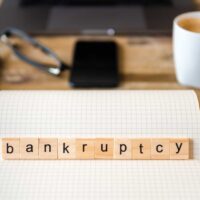Bankruptcy Terms You Should Know

If you’re thinking about filing for bankruptcy, it is essential to learn more about the process, including the basic bankruptcy terminology. The bankruptcy process can be complicated, so understanding the basic legal terms will help you take control of your bankruptcy process and your path toward financial relief. Our Los Angeles bankruptcy attorneys explain the bankruptcy terms you should know. All of the terms below were obtained from the U.S. Courts.
Automatic Stay: An injunction that automatically stops lawsuits, foreclosures, garnishments, and all collection activity against the debtor the moment a bankruptcy petition is filed.
Bankruptcy: A legal procedure for dealing with debt problems of individuals and businesses; specifically, a case filed under one of the chapters of title 11 of the United States Code.
Bankruptcy Estate: All legal or equitable interests of the debtor in property at the bankruptcy filing time. (The estate includes all property in which the debtor has an interest, even if it is owned or held by another person.)
Chapter 7:The chapter of the Bankruptcy Code providing for “liquidation,”(i.e., the sale of a debtor’s nonexempt property and the distribution of the proceeds to creditors.)
Chapter 13:The chapter of the Bankruptcy Code provides for the adjustment of an individual’s debts with regular income. Chapter 13 allows a debtor to keep property and pay debts over time, usually three to five years.
Consumer Debtor: A debtor whose debts are primarily consumer debts.
Debtor: A person who has filed a petition for relief under the Bankruptcy Code.
Discharge: A discharge releases a debtor from personal liability for certain debts known as dischargeable debts and prevents the creditors owed those debts from taking any action against the debtor to collect the debts. The discharge also prohibits creditors from communicating with the debtor regarding the debt, including telephone calls, letters, and personal contact.
Exemptions, Exempt Property: Certain property owned by an individual debtor that the Bankruptcy Code or applicable state law permits the debtor to keep from unsecured creditors.
Liquidation: A sale of a debtor’s property with the proceeds to be used to benefit creditors.
Means Test: The bankruptcy means test determines who can file for debt forgiveness through Chapter 7 bankruptcy. It takes into account your income, expenses, and family size to determine whether you have enough disposable income to repay your debts.
Nondischargeable Debt: A debt that cannot be eliminated in bankruptcy.
Secured Debt: Debt backed by a mortgage, pledge of collateral, or other liens; debt for which the creditor has the right to pursue specific pledged property upon default. Examples include home mortgages, auto loans, and tax liens.
Unsecured Debt: Unsecured debt refers to any type of debt or general obligation that is not protected by a guarantor or collateralized by a lien on the borrower’s specific assets in the case of a bankruptcy liquidation or failure to meet the terms for repayment.
If you need assistance filing for bankruptcy, our Los Angeles bankruptcy attorneys are here to help you. Contact us today at (800) 996-9932 to schedule a consultation!
